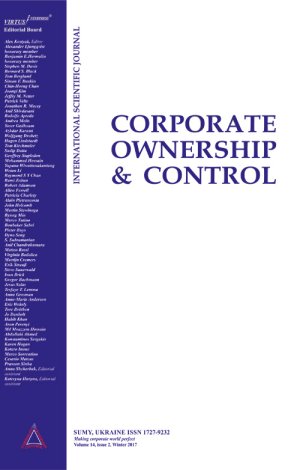
-
 Journal menu
Journal menu

- General information
- Editorial Board and External Reviewers
- Journal Policies
- Publication Ethics and Malpractice Statement
- Instructions for authors
- Paper reviewing
- Article processing charge
- Feedback from stakeholders
- Journal’s Open Access statement
- Order hard copies of the journal
- 50 most cited papers in the journal
CHANGES OF AUDIT METHODOLOGIES IN LESS DEVELOPED COUNTRIES: AFFIRMATION OF INTERNATIONALISATION, REALITY OF AUDIT PRACTICE AND SOCIETY’S NEGOTIATION
Download This ArticleAbstract
This paper reports on an interpretive study carried out to explore the change of audit methodologies toward the Business Risk Audit (henceforth, the BRA) approach in Less Developed Countries (henceforth, LDCs). It argues that changes of audit methodologies in LDCs proceeds through assurance of the international affiliation by the Internationally Affiliated Audit firms (henceforth, IAA), confrontation of reality of local audit practice and social discourse about the international affiliation rather than the actual change of the core of the audit methodology itself in order to claim quality, superiority, and knowledge. The study found that the approach has been promptly introduced artificially in manuals and other materials but without sufficient efforts to relax the existed and approved challenging environmental factors that prevent the practical application of the approach. This consistent with the argument which says that audit manuals might resemble the worldwide audit manual of the global audit approach of the large international firm, but in the local environments auditors could shelve significant parts of such a manual because of facts on the ground and work according to the reality of their audit society. Nevertheless, IAA firms in their negotiation with their community endeavor to argue the international logo of their audit approaches as a clue of their advancement, modernization, and superiority of knowledge over the locally less developed audit practice. This behavior is likely to reflect the social perceptions of the society in LDCs about the definition of the international logo, the ambiguous of the term of audit quality, dependency of LDCs on more developed countries for development, and aspiration toward evolution. Given such reference of quality and superiority of knowledge, the study argues that innovations in audit technologies are not imported to LDCs only because of their technical benefits but more important to serve social functions, mainly affirmation of international affiliation as clue of advancement and superiority.
Keywords: Change of Audit Methodology, Less Developed Countries, Business Risk Audit, Audit Practice, Audit Environment, Saudi Arabia
How to cite this paper: Alnodel, A., Turley, S. (2010). Changes of audit methodologies in less developed countries: affirmation of internationalisation, reality of audit practice and society’s negotiation. Corporate Ownership & Control, 7(3-2), 304-322. https://doi.org/10.22495/cocv7i3c2p5

















